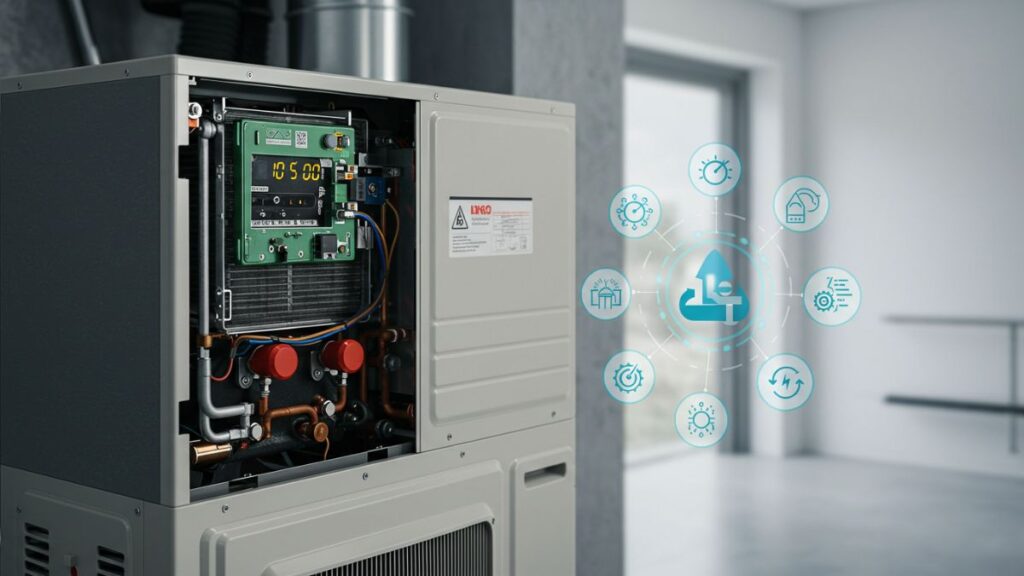In today’s world, managing energy consumption has become a priority for homeowners and businesses alike. Heating, ventilation, and air conditioning (HVAC) systems significantly contribute to building energy use, accounting for a substantial portion of utility bills. Investing in energy-efficient HVAC systems can lead to considerable savings while reducing environmental impact. We will explore how these systems contribute to long-term financial benefits by lowering energy costs, improving system longevity, and enhancing overall comfort. Understanding these advantages can help individuals make informed decisions that benefit their wallets and the planet.
How Energy-Efficient HVAC Systems Deliver Sustainable Savings
Reduced Energy Consumption and Lower Utility Bills
Energy-efficient HVAC systems are designed to use less electricity or fuel while providing the same or better level of heating and cooling compared to older or conventional units. Features such as advanced compressors, variable-speed motors, improved insulation, and smart thermostats allow these systems to operate more effectively and avoid unnecessary energy use. For example, a system with a high Seasonal Energy Efficiency Ratio (SEER) rating consumes less power during cooling months, directly translating into lower monthly energy bills. Many manufacturers provide detailed information about these features on their website, helping consumers make informed decisions. Over the unit’s lifespan, these reductions accumulate into significant financial savings. Although the initial investment may be higher, the lower operational costs generally offset the upfront expenses within a few years, making it a financially sound choice in the long run.
Enhanced Durability and Extended Equipment Lifespan
Energy-efficient HVAC systems often incorporate newer technology and higher-quality components, contributing to improved durability. These systems experience less wear and tear because they avoid running at full capacity unnecessarily. Variable-speed compressors and fans adjust their output according to demand, preventing the system from cycling on and off frequently. This smoother operation reduces mechanical stress and extends the system’s overall lifespan. A longer-lasting HVAC system means fewer replacements and repair costs over time, increasing the total savings. Maintaining such systems properly also ensures consistent performance and energy savings, reinforcing the financial advantages of investing in energy efficiency.
Lower Maintenance and Repair Costs
Because energy-efficient HVAC systems operate with advanced technology and more precise controls, they generally require less frequent maintenance and encounter fewer breakdowns. Components like smart sensors and diagnostic tools can detect potential issues early, allowing for timely interventions before problems escalate. This proactive approach helps avoid costly emergency repairs and prolongs the time between service appointments. The reduced strain on mechanical parts also minimizes the risk of wear-related failures. Over time, this translates to lower maintenance budgets and fewer disruptions caused by system downtime. Combining energy savings and reduced upkeep costs makes energy-efficient HVAC units an economical choice for residential and commercial applications.
Increased Property Value and Market Appeal
Installing energy-efficient HVAC systems can also enhance a property’s overall value and attractiveness. As energy costs rise and environmental concerns grow, buyers and tenants increasingly seek buildings with lower utility expenses and sustainable features. Properties equipped with modern, efficient heating and cooling systems stand out in the real estate market by promising long-term savings and comfort. This advantage can lead to faster sales or higher rental income, effectively contributing to the owner’s financial returns. Furthermore, many regions offer incentives, rebates, or tax credits for upgrading to energy-efficient equipment, which can reduce initial costs and add to the overall financial benefit.
Environmental Benefits That Support Long-Term Cost Savings
Although not a direct financial factor, the environmental advantages of energy-efficient HVAC systems shape future economic conditions. By reducing energy consumption, these systems help lower greenhouse gas emissions and decrease reliance on fossil fuels. This reduction can contribute to mitigating climate change and its associated costs, such as damage to infrastructure and increased energy prices due to scarcity. Governments and utility companies may implement stricter regulations and higher fees on inefficient energy use, making older HVAC systems more expensive to operate or maintain. Choosing energy-efficient technology helps avoid these potential future expenses and aligns with sustainable practices that benefit communities and economies in the long term.
Improved Comfort Leading to Indirect Savings
Energy-efficient HVAC systems provide more consistent temperature control and better air quality, which can improve occupant comfort. Features like variable-speed fans allow the system to maintain a steady temperature without the large fluctuations common with older models. This can reduce the need for supplementary heating or cooling devices, which consume extra energy and add to utility bills. Enhanced comfort also means less wear on the system, since it operates smoothly and continuously at optimal levels. While harder to quantify, these indirect savings contribute to overall energy efficiency and reduced operational costs, supporting the financial rationale for upgrading HVAC equipment.
Integration with Smart Home and Building Systems
Modern energy-efficient HVAC units often include compatibility with smart home technology or building automation systems. This integration allows for more precise heating and cooling control, optimizing energy use based on occupancy patterns, weather forecasts, and personal preferences. For instance, smart thermostats can automatically learn user habits and adjust settings, avoiding wasted energy during unoccupied periods. This technology maximizes efficiency and provides valuable data to monitor and manage energy consumption over time. The resulting cost savings can be significant, especially in larger commercial buildings or households aiming to reduce their environmental footprint without sacrificing comfort.
The long-term savings provided by energy-efficient HVAC systems extend well beyond simple reductions in monthly energy bills. These systems contribute to lower maintenance and repair expenses, longer equipment lifespans, and increased property values. Environmental benefits and improved occupant comfort also enhance their overall value, making them a wise financial and ecological investment. As technology advances, the cost-effectiveness and availability of energy-efficient HVAC options will likely increase, offering even greater potential for savings in the future. By choosing energy efficiency today, individuals and organizations set themselves up for sustained economic and environmental advantages over the years ahead.






